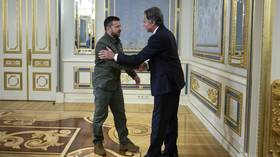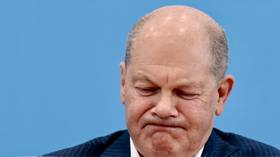‘World’s largest investigative journalism organization’ secretly controlled by US government – report

The US government secretly controls around half of the funding for the world’s largest investigative journalism network, the Organized Crime and Corruption Reporting Project (OCCRP), a joint investigation by Mediapart, Drop Site News, Il Fatto Quotidiano, and others has revealed. The probe also found that the US exerts veto power over OCCRP's leadership and editorial direction.
Launched in 2008 and initially focused on exposing corruption and organized crime in the Balkans, the OCCRP now operates with a budget of €20 million and a team of 200 journalists worldwide, and works with over 70 media partners, including big names such as the New York Times, The Guardian, and Der Spiegel.
It has grown into the world's foremost international investigative journalism player, known for work such as The Panama Papers and the Pegasus Project.
The investigation, led by Mediapart and published on Monday, reveals that Washington not only provides substantial financial support - $47 million from US state sources since its inception - but has the power to control leadership appointments.
US influence extends to steering the group’s investigations towards specific countries such as Russia and Venezuela, the report adds.
Drew Sullivan, the OCCRP’s co-founder and publisher, confirmed that the US government remains its largest donor, with USAID and other federal agencies also contributing millions to the organization over the years.
“I’m very grateful to the US government,” Sullivan told German state broadcaster NDR in September 2023, when the Hamburg-based channel's own investigation into the OCRP prompted it to suspend cooperation with the organization.
US funding is crucial to OCCRP operations, Sullivan admitted. The money, however, comes with conditions.
The US government has the right to veto key personnel at the OCCRP, including Sullivan himself. Washington also requires the organization to use its funds for investigative projects targeting specific countries, such as Russia, Venezuela, and other geopolitical interests.
For example, OCCRP received $2.2 million to work on “Balancing the Russian media sphere,” a project aimed at investigating Russian media, and $2.3 million to investigate corruption in Cyprus and Malta, which could be used against Moscow.
The US government has also weaponized OCCRP’s reporting by fueling judicial investigations, sanctions, and lobbying based on the organization’s findings. The Global Anti-Corruption Consortium (GACC), created in 2016 and co-funded by the US, uses OCCRP’s investigations to drive sanctions advocacy and legal initiatives against countries and individuals deemed corrupt by Washington.
According to USAID’s Mike Henning, the OCCRP’s work is seen as a key tool for advancing US foreign policy. “We’re proud that […] the US government is the first public donor to OCCRP,” he said. “Funding must be aligned with and advance United States foreign policy and economic interests,” he added, pointing to the strategic nature of such investments.
However, critics argue that the close relationship with the US government compromises the organization’s editorial independence. “It makes the US seem virtuous and allows them to set the agenda of what is defined as corruption,” said a director of a South American media outlet that worked with the OCCRP, as quoted by Mediapart.
Despite its claims of editorial independence, critics argue that the OCCRP’s reliance on US government funding compromises any neutrality it could possibly claim.
The US government’s influence over OCCRP’s finances has led to concerns about the organization’s ability to operate independently and prompted state-level media partners to cease cooperation, according to Mediapart, particularly when it comes to reporting on US-related corruption or similar issues.













